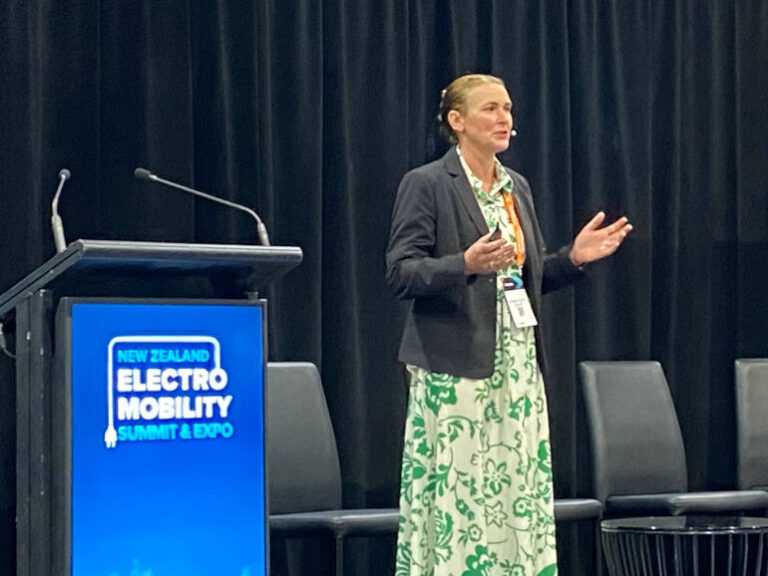Kirsten Corson, Board Executive at Drive Electric NZ, spoke passionately at the 2024 Mobility Summit in Auckland about why electric vehicles (EVs) are essential for New Zealand, the future of EV technology, and practical steps to optimise fleets. With New Zealand’s growing climate obligations, she emphasised the critical need for the country to accelerate its transition to cleaner transportation.
Corson underscored the necessity of EV adoption as a response to increasing decarbonisation pressures. With 80% of New Zealand’s export partners implementing mandated climate disclosures, local businesses face mounting expectations from international clients to decarbonise. Major companies like Fonterra and Silver Fern Farms are under pressure from suppliers to reduce carbon footprints, which directly ties into the importance of emissions reduction for the country as a whole.
New Zealand has committed to the Paris Agreement, yet Treasury reports show the country is not on track to meet its targets, which could cost New Zealand between $3 billion and $24 billion in carbon-offset payments. Corson highlighted the economic and environmental burden of the country’s fossil fuel imports, which cost New Zealanders $8-9 billion annually. Furthermore, transport emissions, a significant contributor to national pollution, are reportedly linked to over 2,200 premature deaths each year in New Zealand.
Corson made it clear that transitioning fleets to EVs is crucial, as businesses account for 60-70% of vehicle purchases in New Zealand. By shifting business fleets to EVs, companies can directly reduce carbon emissions. These fleets influence the country’s long-term emissions as vehicles often remain on New Zealand roads for 15-20 years, underscoring that decisions made now have lasting implications for 2030 and beyond.
The Next Big Things for Electric Vehicles
Corson touched on exciting global developments in the EV market and what these advancements mean for New Zealand. She noted that global EV sales continue to rise, moving from an early adopter phase into a mass-market stage. In 2023, 14 million EVs were sold worldwide, making up about 18% of all new vehicles sold. Despite economic challenges, Corson anticipated further growth in 2024, with an expected 17 million EV sales.
Global Innovations and Lessons for New Zealand
Corson referenced progressive policies in France, China, and Norway. For example, France has invested significantly in EV charging infrastructure and subsidies for both vehicles and charging stations, creating a comprehensive approach that encompasses cars, heavy transport, and micro-mobility solutions like e-bikes. This holistic approach not only supports EV adoption but also attracts foreign investment in infrastructure.
China has taken a similar path, focusing on “clean energy” across EVs, solar, and battery storage. With massive investments in charging infrastructure, China now hosts over 9 million public chargers, which Corson cited as an aspirational model for New Zealand. In addition, Norway’s commitment to a well-rounded EV policy framework has resulted in over 90% of new car sales being electric, though Corson noted that only 30% of the total fleet is currently electric, highlighting the time it takes to transition fully.
Corson also spoke about technological developments on the horizon that will shape the future of EVs. She predicted that EVs will achieve price parity with internal combustion vehicles by 2026, driven partly by Chinese manufacturers’ aggressive market expansion. Advances in battery chemistry are accelerating, with solid-state batteries on the horizon promising higher performance and lower costs. Corson highlighted the growth of the circular economy for EV batteries in Norway and Sweden, where old batteries are repurposed, reducing demand for new rare earth minerals.
The integration of bi-directional charging capabilities in EVs, which can allow vehicles to feed power back to the grid or homes, represents another key area of advancement. This shift will further reduce dependence on traditional energy sources, especially for those who can combine solar power, battery storage, and EVs.
Advice to Optimise Your Fleet
Corson concluded her presentation with practical guidance for businesses looking to optimise their fleets as they transition to EVs. She stressed that fleet managers should begin by conducting a total cost of ownership analysis, as EVs, despite their higher upfront costs, often present lower long-term expenses compared to conventional vehicles.
Another crucial step in the optimisation process involves using GPS data to assess fleet utilisation. Corson noted that many fleets are often oversized, resulting in underutilisation. By leveraging data on vehicle usage patterns, businesses can identify vehicles that can be removed from the fleet, thereby freeing up resources to invest in EVs.
Corson suggested considering options such as micro-mobility solutions and public transport subsidies for employees. By doing so, companies can not only reduce their fleet size but also promote sustainable transport alternatives. She cited examples of companies like Genesis Energy, which subsidises public transport, and Datacom, which offers free bike servicing, as practical ways businesses can support sustainable commuting.
For businesses providing company vehicles, Corson encouraged fleet managers to critically evaluate the necessity of cars used primarily for commuting to and from work, as these vehicles often add to emissions without contributing to productive use during work hours.
Moving Forward
Corson’s presentation left attendees with a powerful message on the urgency and necessity of optimising fleets and adopting EVs for both environmental and economic reasons. She urged New Zealand businesses to take a proactive role in driving policy change by voicing their support for sustainable practices and policies.
Corson emphasised that while it’s easy to feel that New Zealand lacks the extensive EV policies seen in Europe or China, there are still significant actions businesses can take to support the shift toward sustainable transport. By adopting EVs, optimising fleet usage, and advocating for policies that encourage sustainable transport, New Zealand businesses can make meaningful strides toward decarbonisation.






